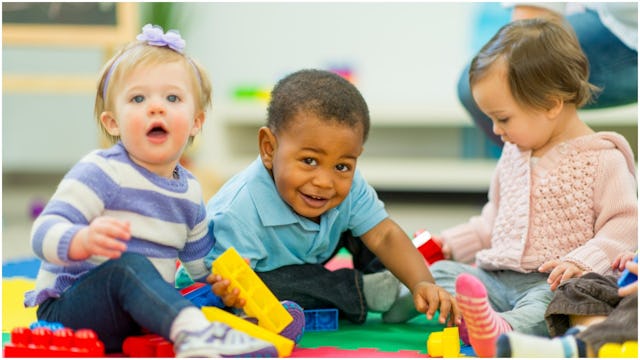Study Says Kids In Daycare Are Better Behaved Than Those Who Stay At Home

A new study found that kids in daycare are better behaved than those who stay at home
If you’re feeling any guilt about sending your child to daycare, the results of this new study will provide some much-needed comfort. According to a research report from Sorbonne University, kids who attend daycare tend to exhibit better behavior than those who don’t. There’s also a few other important added benefits, including improved social skills and cognitive development.
Researchers from Sorbonne surveyed nearly 1,500 children from infancy until they turned 8 years old. They asked parents to fill out surveys during that period of time, which chronicled their child’s behavior. The final conclusion? “High-quality, centre-based childcare may be linked to lower levels of emotional symptoms,” researchers wrote.
Sorbonne researchers began their work by dividing the children into three different groups: centre-based care (the French equivalent of daycare), childminders (professional caregivers who look after 2-6 children), and at-home childcare.
The results determined that the children who attended daycare for more than one year demonstrated better social skills and fewer peer-related difficulties. There were also long-term benefits on a child’s overall mental health.
“Access to high-quality childcare in the first years of life may improve children’s emotional and cognitive development, prevent later emotional difficulties and promote prosocial behaviours,” Dr. Maria Melchior, co-author of the report, told Popsugar.
Kids in daycare won’t just gain better social skills. They might also get better grades down the line. The study noted that early childcare can have an impact on a child’s academic abilities, including “cognitive, language and preacademic skills.”
These findings were corroborated by a 2010 U.S. National Institutes of Health study which found that daycare has a lasting, positive behavioral effect on children. Researchers noted that kids who attend daycare are slightly less likely to exhibit impulsive, risk-taking tendencies as teenagers. They also pointed out that there is a small link between daycare and academic success.
The study emphasized the importance of warm, positive interactions between young children and their caregivers. Those relationships can have a big impact down the line.
“These results underscore the importance of interaction between children and their daytime caregivers,” Deborah Lowe Vandell, co-author of the study, said. “We’re seeing enduring effects of the quality of staff-child interaction.”
This article was originally published on